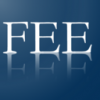

| Visitors Now: | |
| Total Visits: | |
| Total Stories: |

| Story Views | |
| Now: | |
| Last Hour: | |
| Last 24 Hours: | |
| Total: | |
Remembering Heroes of Darker Days
I had the great fortune to spend last week teaching at the Advanced Austrian Economics seminar at FEE’s Irvington-on-Hudson mansion. As readers may or may not know, the mansion has been sold, although it may take some time before all of the bureaucratic hurdles are crossed. It was, most likely, the last time I would be there for that very special seminar. On the final evening the Foundation hosted an gathering, and dozens of alumni and FEE supporters came to the event. At one point in the evening I wandered into the library and found myself alone in the room, for perhaps the last time.
That library is a very special place, having been occupied by some of the most important figures in twentieth-century classical liberalism, including Leonard Read, Ludwig von Mises, F. A. Hayek, Henry Hazlitt, and Israel Kirzner among many others. What they did over the last 66 years to keep the flame of freedom alive is truly heroic, which is a word I do not use lightly. Not only did they keep the flame lit, they also nourished it and expanded its reach until the ideas they were committed to are now burning much more brightly across the United States and the world.
What is most remarkable about their work in that room, and the early years of FEE more generally, is how dark those days were in terms of classical-liberal ideas. It might be hard to believe–living at a time when we face larger governments than ever in the western world and when enormous deficits and debts threaten our prosperity and that of our children and grandchildren–that things used to be darker. When so many voices since 2008 have called so quickly for larger government and have condemned capitalism in the face of a government-created boom and bust, it is understandable how many, particularly younger, classical liberals could think this is the worst of times.
It is not.
Keynesian Triumph
The world of the late 1940s was far worse. In economics the defenders of free enterprise had been routed by the combination of Keynesianism and “market socialism” during the interwar era. Despite the best efforts of Hayek and others, the Keynesian revolution overtook the economics profession, arguing that economies required macroeconomic management and budget deficits to avoid capitalism’s built-in failures. Mises and Hayek also made a strong, and ultimately vindicated, case against socialism, but the philosophically and theoretically biased profession accepted the claim that socialism could be just as efficient as capitalism. By the time FEE was founded in 1946, all of the economists truly committed to classical liberalism could have fit in that library.
Politically, the number of public intellectuals or political figures willing to defend free enterprise was equally small, if not smaller. The accepted view was that capitalism had failed and that an alternative was necessary. Perhaps it was a form of socialism, but at the very least it would involve much more government. Proposals for “scientific” planning of the economy were commonplace in the western world, especially in Great Britain, and there were no real outlets for defenders of classical liberalism to get their ideas across.
This was the world that Read, Mises, Hayek, Hazlitt, and, a little later, Kirzner were operating in. Their commitment to these ideas–as well as their intellectual courage in continuing to develop and promote them when they were considered beyond the pale of serious intellectual conversation—is astonishing.
A New World
In our own time we still face a largely hostile media, academy, and intellectual/political class. However, the presence of classical liberals in all those arenas is much greater than it used to be. Even looking just at Austrian economics makes this clear. In 1946 there were maybe ten practicing Austrian school economists–at most. Today there are hundreds worldwide. There are at least two academic journals devoted to Austrian economics, as well as multiple research centers and book series. Austrians appear on TV and elsewhere in the media, and their ideas are part of the political debate, thanks to Ron Paul and others.
All the same can be said, and perhaps more so, about the freedom movement more generally. Libertarian ideas are in the debate. That they are often caricatured only means they are important enough to engage. We also have our own platforms to get our ideas out, and the Internet has made it possible to share our ideas with millions much more easily than ever before. As the ideas are spread, they catch on. The spectacular growth of Students for Liberty bodes well for the future.
Finally, the biggest enemy of freedom is dead. Serious socialism is not really on the table intellectually, and the Soviet Union and its client states have been consigned to the dustbin of history. One important reason is the work of that small band of dogged scholars who occupied the FEE library for so many years. In saying goodbye to that room, we would be remiss if we did not acknowledge the courage and leadership of them all.
Brought to you by The Freeman Magazine a publication from the Foundation for Economic Education. Love economics? Like FEE on or follow us on Twitter!
2012-08-08 21:38:43
Source: http://www.thefreemanonline.org/headline/remembering-heroes-of-darker-days/
Source:


